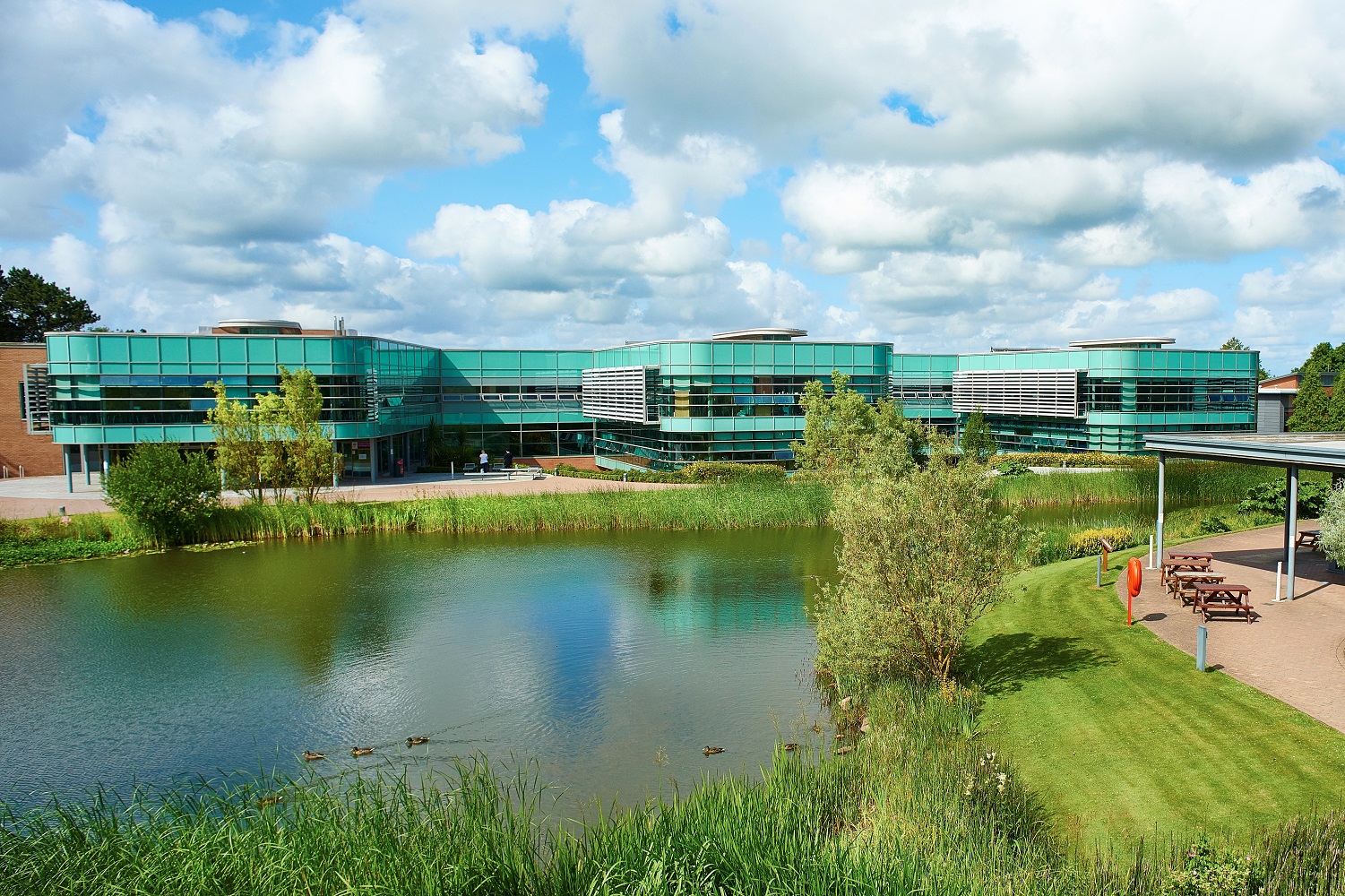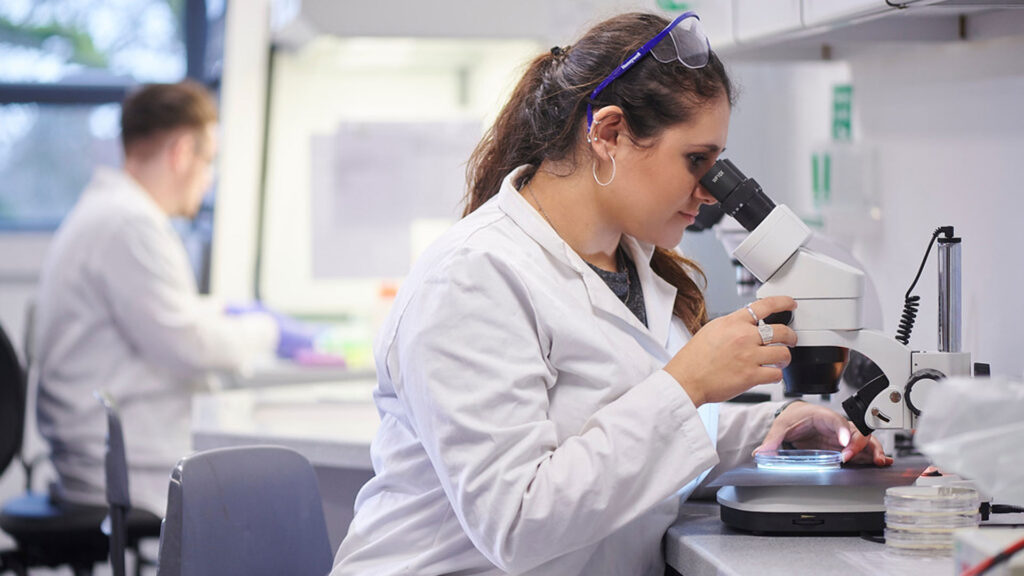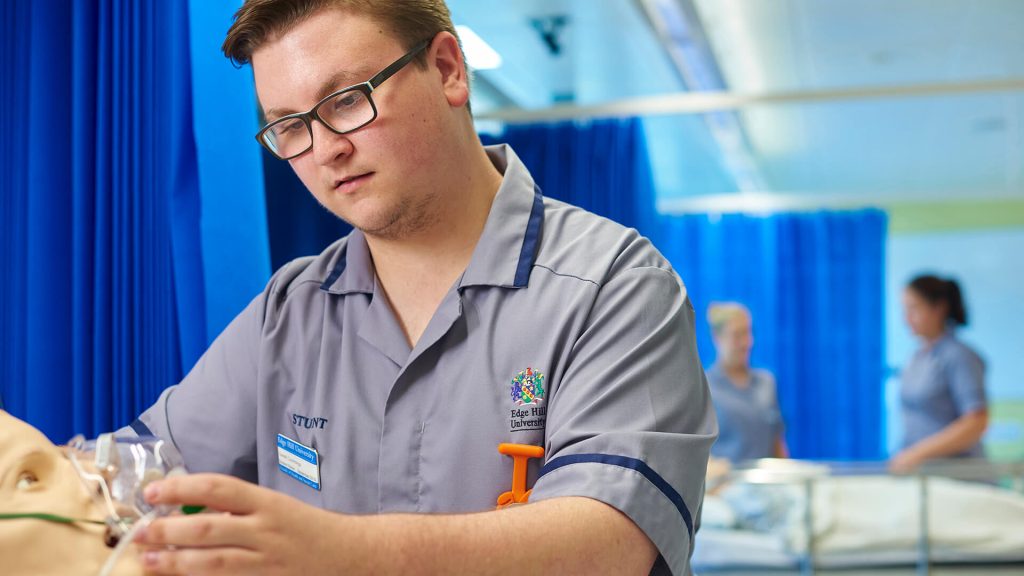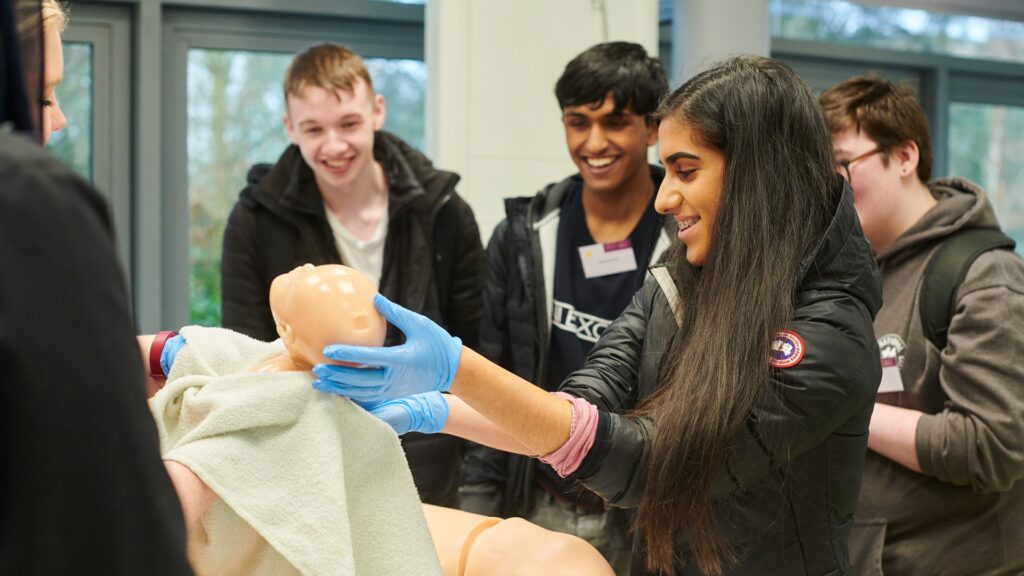Medicine with Foundation Year MBChB
UCAS code: A110
Join an integrated Foundation Year that enables you to gain an understanding of key concepts within the field of medicine and meet the required academic level to progress to our MBChB Medicine degree.
Closed to applications for September 2024.
Overview
| Course length: | 6 years full-time |
|---|---|
| Start dates: | September 2024 September 2025 |
| Location: | Edge Hill University |
| Example offers: | BBB (A Level) View full entry criteria |
| Subject(s): | Medicine |
| Faculty: | Health, Social Care and Medicine |
| Department: | Medical School |

The MBChB Medicine with Foundation Year is an integrated 6-year programme where you will complete a Foundation Year before progressing onto our MBChB Medicine degree, subject to passing all assessments and meeting course requirements. The information below describes the Foundation Year only. The curriculum for the subsequent five years is as outlined for MBChB Medicine.
The MBChB Medicine with Foundation Year is aimed at students from the North West of England who have the potential and aspiration to become doctors. It is for anyone who has studied the A levels needed to join our MBChB Medicine degree but whose background may mean it is less likely that they will be able to meet the academic requirements for direct entry. You must satisfy certain widening participation criteria to be eligible to apply.
The programme prepares you for the rigours of studying medicine, with a curriculum focused on health in the community. You will engage in disciplines such as health systems and public health, sciences for medicine, and working in multi-disciplinary teams in healthcare. Personal and professional development, including communication and interpersonal skills, is another key strand of the programme. The course has professionalism as core and integrated throughout the programme. Opportunities for clinical and community learning will be supported by work experience, voluntary work or work shadowing to develop your understanding of the people within the local community where care is provided.
Please note, this Foundation Year does not normally lead to an award or qualification in its own right, however successful completion of the Foundation Year at the required pass mark enables progression onto the MBChB Medicine programme at Edge Hill University.
Course features
-
Professional accreditation
-
Professional practice placements
What you'll study
You will study subjects that underpin six core themes within the Foundation Year, which will prepare you to progress to the MBChB Medicine.
Adopting a non-modular approach, the Foundation Year curriculum has the following themes throughout its year of study:
- Science for medicine: basic biomedical sciences; anatomy and physiology of the human body (system approach); structure and function of the human body related to health and illness.
- Clinical perspective from a multi-disciplinary team approach: acute illness – national and local proactive approaches; long-term conditions in the general and local population; the basic principles of patient safety; multi-disciplinary team perspectives; National Institute for Health and Care Excellence (NICE) guidelines; General Medical Council (GMC) competencies.
- Professional and personal development: personal and professional attitudes; legal and ethical principles of the profession; professionalism; reflection; leadership and management principles; placement learning; mentoring and coaching.
- Communication for clinical practice: different styles and methods of communication; barriers to effective communication; communication skills with patients, colleagues and carers; written and academic communication for practice; models and theories of communication; patient-centred communication.
- Health, health systems and public health: definitions of health and ill health; concepts of health; social determinants of health; public health; individual, community and population perspectives and approaches; health data sources and health and disease patterns; trends in health data at individual and population level; health and social care needs of the local community; psychological and social context of health and illness; the role of the World Health Organisation (WHO) and other international agencies.
- Study and academic skills: sessions will be delivered to prepare you for the rigours of studying medicine. These sessions will facilitate the transition to undergraduate study and support the introduction of professional skills to enhance your future employability. You will be encouraged to develop confidence and resilience in your journey to becoming a reflective lifelong learner.
You will gain perspectives on clinical and community learning through work placements, where you will be supported to reflect on and learn from these experiences. Professional behaviours and development are integrated throughout the course.
On successful completion of the Foundation Year, you will progress to Year 1 of the MBChB Medicine degree.
How you'll study
The Foundation Year is delivered through a combination of lectures, seminars, science-based practicals, clinical skills workshops, tutorials and work experience opportunities within local healthcare settings. You will be responsible for travel and parking costs while attending your work experience.
Although the weekly direct contact time may vary, you can typically expect to attend sessions for 2.5 to 3 full days a week, with the remaining time for academic and Personal Tutor support and independent study.
How you'll be assessed
During the Foundation Year, you will be assessed through a combination of presentations, portfolio, reflective essay, clinical case-based scenarios. Your professionalism will be reviewed and assessed throughout the programme. This will include elements such as your conduct, engagement and attendance.
Who will be teaching you
The Foundation Year programme team includes medical practitioners, bio-medical scientists, public health specialists, psychologists, nutritionists, multi-disciplinary professional registrants, NHS placement providers and clinical experts from local healthcare settings.
A variety of service users, carers and expert guest lecturers will also contribute to the delivery of the programme to cover particular specialist themes.
Entry criteria
Entry requirements
Grades BBB at A Level are required. These must include Biology and Chemistry and one other subject.
While Biology and Chemistry are both required at Grade B or above, where Grade A or A* is achieved in either Biology or Chemistry (or both Biology and Chemistry), the third A Level subject will be accepted at Grade C or above.
A Levels in General Studies, Critical Reasoning, Citizenship and Key Skills will not be accepted.
You will also need at least five GCSEs at Grade B or Grade 6 or above (or equivalent) at the time of application, including Biology, Chemistry, English Language and Mathematics. GCSE Double Science Awards, at Grades 6-6 or B-B or above, will also be accepted in lieu of separate GCSEs in Biology and Chemistry.
Acceptable equivalencies to A Levels are listed under Example Offers below.
You must be aged 18 or above on the first day of the course. International students are not eligible for this programme. The course will typically begin in mid-September although the exact date will vary for each academic year.
The MBChB with Foundation Year is a widening participation initiative for local students. To be eligible to apply, you must:
- Have lived in the North West of England (Lancashire, Merseyside, Greater Manchester, Cheshire, Cumbria) for at least one year immediately prior to the point of application.
You must also meet one of the following requirements:
- Have attended a non-selective state secondary school for GCSEs where the Attainment 8 score is below the English average. Data will be considered according to the latest relevant Department for Education performance tables.
- Have attended a non-selective state secondary school for GCSEs and either live in an area with a postcode in quintile 1 or 2 in the POLAR4 young participation index or in a neighbourhood with a high level of multiple deprivation with an Index of Multiple Deprivation decile of 4 or below. You can check your postcode against the POLAR4 young participation index and against the Index of Multiple Deprivation.
In addition, you must meet one of the following criteria:
- Live in a low-income household with a combined income below £35,000.
- Have parents who did not go to university or who do not have a higher education qualification.
- Be, or have previously been, in local authority care.
- Sole carer of a parent or sibling
- Have refugee status.
- Be a member of the travelling community.
- Care Experienced and Estranged Students (CEES).
- *Live in an area with a postcode in quintile 1 or 2 in the POLAR4 young participation index. Check your postcode.
- *Live in a neighbourhood with a high level of multiple deprivation, with an Index of Multiple Deprivation decile of 4 or below. Check your postcode..
*Applicants who have used essential criteria number 2 above, may not tick these same criteria as their additional item.
Applicants should provide details regarding how any checked widening participation criteria are met and will be expected to provide evidence of this at a future date, prior to the offer of a place being made.
If your GCSEs were achieved at an educational institution which does not have Attainment 8 data, this will be considered on an individual basis. Please contact us in advance of applying to ensure you are eligible.
Students who have failed to complete the Foundation Year for Medicine will not be considered for re-entry.
Applicants will be required to take the UCAT Medical Admissions Test prior to application. UCAT scores and Multiple Mini Interviews (MMIs) form part of the selection process. UCAT scores can only be used to support an application if they were achieved in the relevant admissions cycle.
Applicants must be of good character and must be open and honest about health conditions or disabilities to ensure and uphold public trust. Individualised support can be implemented as appropriate. It is essential that any issues which may prevent future registration or impact on a student’s practice are declared at the time of application. For example, this includes health, disability, criminal conduct or restrictions on practice imposed by a professional regulatory body. While such declarations will not be taken into consideration in the initial stages of selection, any offers made will be subject to appropriate clearance as detailed below. Applications should be completed as honestly as possible and without omissions. The University reserves the right to withdraw any offer of an interview or place on the Foundation Year programme if it becomes aware of any dishonesty or failure to disclose. Edge Hill University may verify an applicant’s health and character by sharing the applicant’s details with the Medical Schools Council for checking against the Medical Schools Council Excluded Students Database.
If you accept a formal offer from Edge Hill you will need to submit a Declaration of Health in respect of physical and mental fitness. You may be contacted by the University’s nominated Occupational Health Service provider and/or be required to attend an appointment with them to confirm that you can meet the fitness to practise requirements to enter the course.
You will also be required to apply for a Disclosure and Barring Service (DBS) Enhanced Disclosure indicating that you meet the mandatory criteria of ‘Clearance to Work with Children and/or Vulnerable Adults’.
Further information about the Declaration of Health and DBS Enhanced Disclosure will be sent to you after you have firmly accepted an offer.
Example offers
You can satisfy the A Level criteria by achieving one of the following combinations:
- Grades BBB including Biology and Chemistry and one other subject.
- Grades ABC including Biology and Chemistry, with one of these subjects at Grade A or above and the other at Grade B or above, as well as one other subject at Grade C or above.
The following are also accepted for this course:
- A Level / BTEC Combination: BB at A level and D in single BTEC Level 3 Subsidiary Diploma or National Award. BB at A level must be obtained in both Chemistry and Biology and D in BTech Diploma.
- International Baccalaureate: 32 points to include Chemistry and Biology at higher level, one other subject at higher level and three standard level subjects. Each subject must be passed with a minimum of 5 points. If you are studying International Baccalaureate Biology and/or International Baccalaureate Chemistry in combination with other A Level subjects, this can be accepted as long as 6 points at higher level are achieved in these subjects.
We will not accept applications from graduates for the foundation year.
Applications from mature students are welcomed. There is no requirement for the academic qualifications in the entry criteria to have been completed in the past two years.
If you have any queries about whether your qualifications will satisfy the entry criteria for this course, please email [email protected] and we will be happy to advise you.
English language requirements
Applicants who have studied overseas and who do not have GCSE English (first) Language at B/6 or above or recognised equivalent, must gain IELTS at the required level.
These levels are currently IELTS of 7.5 overall (with no elements below 7.0) for entry onto the MBChB with FY and the MBChB Programmes. IELTS do not need to be gained prior to application but must be listed as pending on the application form and achieved prior to interview.
IELTS cannot replace GCSE English Language at Grade B or Grade 6 or above for applicants who have studied GCSEs.
For applicants who have already completed IELTS, these must be gained within two years of starting the course
Selection process
Stage 1: Application screening against the standard academic criteria
All applications will be screened to determine whether they meet the standard academic criteria. Applications which do not meet the minimum eligibility and academic criteria will not be progressed to the next stage.
Stage 2: UCAT ranking
Applicants who meet the minimum academic criteria will be ranked according to their UCAT scores. A UCAT threshold will be set depending on the number of interviews to be held.
Applicants who meet the UCAT threshold will be invited to interview. The UCAT threshold set by the University may differ from year to year as it is dependent on the scores achieved by those who apply to us in each admissions cycle. Any candidate scoring within band 4 in the Situational Judgement Test will be automatically rejected.
The UCAT threshold will be extended for candidates who meet specific widening participation criteria or have successfully completed the Widening Access to Medicine Programme at Edge Hill University.
Stage 3: Interview
All candidates who progress from stage 2 will be required to attend interview. Interviews for September 2023 entry will take place in January 2023.
The interview will take the form of Mini Multiple Interviews (MMI) which could assess the following (mapped onto good medical practice):
- Understanding and motivation for wanting to join the MBChB programme at Edge Hill University.
- Verbal communication skills.
- Integrity/probity.
- Teamwork/leadership.
- Empathy and compassion.
- Awareness of current health challenges.
- Ethical awareness.
- Awareness of self and others.
- Prioritisation/decision making.
- Interpretation of data.
Stage 4: Scoring
A score will be given for performance at each MMI station and individual scores combined. Applicants will be ranked according to their overall MMI score and offers made to the top students.
Offers will be made to candidates who have the highest combined scores subject to satisfactory references. The personal statement and reference will be used to allow us to distinguish between borderline applicants.
Additional requirements
As outlined in the entry criteria, if you accept an offer from Edge Hill you will be required to complete a Declaration of Health questionnaire and may be contacted by the University’s nominated Occupational Health Service provider and/or be required to attend an appointment with them.
You will also be required to apply for a Disclosure and Barring Service (DBS) Enhanced Disclosure indicating that you meet the mandatory criteria of ‘Clearance to Work with Children and/or Vulnerable Adults’.
Admissions policy
Our admissions policy for this course and Medical School admission appeals procedure for this course are available to download.
How to apply
Apply full-time
Read our guide to applying through UCAS to find out more about the application process.
International
EU/EEA and Swiss students who have settled or pre-settled status under the EU Settlement Scheme, as well as Irish nationals, are eligible to apply for this course.
Please note this course is not available to other international students. Please see our A-Z of courses for alternative options.
Should you accept an offer of a place to study with us and formally enrol as a student, you will be subject to the provisions of the regulations, rules, codes, conditions and policies which apply to our students. These are available at www.edgehill.ac.uk/studentterms.
If you join a full time undergraduate degree at Edge Hill University, we will guarantee you the offer of a room in our halls of residence for the first year of your course.
Discover our accommodation
Facilities

The Faculty of Health, Social Care and Medicine offers outstanding facilities for the education and training of health and social care professionals.
The contemporary teaching and learning resources include leading edge clinical skills facilities, an 860-seat lecture theatre, and a variety of teaching rooms and social learning spaces.
Where you'll study
Clinical Skills and Simulation Centre
Faculty of Health, Social Care and Medicine
Learning resources
The Clinical Skills and Simulation Centre offers a variety of simulated environments from home, through primary and emergency care, to secondary care and beyond. The flexible and adaptable facilities include a ward environment, operating theatre, an anatomy and ultrasound resource centre, a ‘Better at Home’ suite, clinical skills area and consultation rooms.
You will benefit from access to a wide variety of healthcare equipment, as well as a range of full-body patient simulators that can breathe, talk, have pulses and can simulate a wide range of symptoms and clinical conditions. This will enable you to undertake practical scenarios in realistic settings, providing ideal preparation for professional practice placements and future employment.
Finance
Tuition fees
UK Full-Time
£9,250
a year
EU/EEA and Swiss students who have settled or pre-settled status under the EU Settlement Scheme, as well as Irish nationals, may be eligible for the UK tuition fee rate.
Financial support
An NHS bursary is available subject to availability during the 5th and 6th year of study. Please visit the Gov.UK page containing information on NHS bursaries for further information.
Subject to eligibility, UK students joining this course can apply for a Tuition Fee Loan from the Government to cover the full cost of tuition fees. UK students enrolling on the course may also be eligible to apply for additional maintenance loan funding to help with living costs. Please view the relevant Money Matters guide for comprehensive information about the financial support available to eligible UK students, together with details of how to apply for potential funding.
EU/EEA and Swiss students who have settled or pre-settled status under the EU Settlement Scheme may be eligible to apply for financial support. Irish nationals can ordinarily apply to Student Universal Support Ireland (SUSI). Please see our EU student finance page for further details.
Your future career
Upon achievement of the required pass mark for the Foundation Year, you will progress to our five-year MBChB Medicine programme. Successful completion of this five-year course will lead to a Primary Medical Qualification which will enable you to apply to the General Medical Council (GMC) for provisional registration and licence to practise, subject to meeting any additional GMC criteria such as fitness to practise.
Provisional GMC registration with a licence to practise enables doctors to work in approved UK Foundation Year 1 (F1) posts, subject to any additional requirements like passing a Situational Judgement Test. You are not allowed to undertake any other service post. After successful completion of the GMC Foundation Programme you can apply for full GMC registration. Candidates should be aware that regulations may change and they should consult the GMC website at www.gmc-uk.org for further details and the latest information.
Those students who do not progress to medicine will be supported to progress to a diverse range of alternative programmes which enable professional registration or introduce you to applied health and social care.
Course changes
Every effort has been made to ensure the accuracy of this information, however our courses are subject to ongoing review and development. Changing circumstances may necessitate alteration to, or the cancellation of, courses.
Changes may be necessary to comply with the requirements of professional bodies, revisions to subject benchmarks statements, to keep courses updated and contemporary, or as a result of student feedback. We reserve the right to make variations if we consider such action to be necessary or in the best interests of students.











